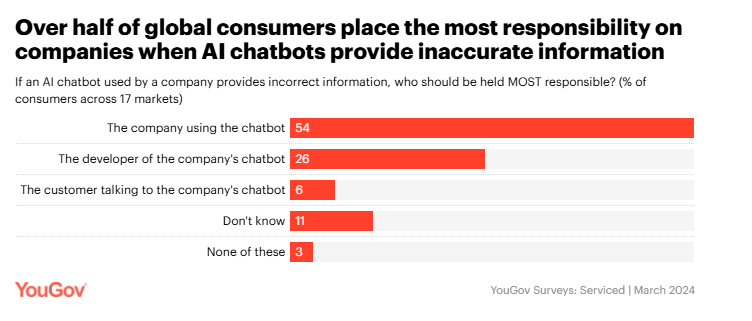The missing link in AI success: how structured content can power Salesforce's enterprise vision

When you think about AI needing data – ask yourself, what kind of data are we talking about?
GenAI has opened new possibilities for AI-driven business interactions, but success hinges on one critical factor: the quality and structure of underlying data. As companies explore GenAI implementation, many are discovering their content lacks the necessary foundation for effective AI deployment. A common issue is the lack of rich metadata, which means AI struggles to understand the context and appropriateness of certain content in a given situation. This challenge has resulted in well-documented AI hallucinations, where AI generates completely incorrect yet confident responses. The risks extend beyond individual incidents. A YouGov survey of 18,000 consumers across 17 markets revealed that 71% of global consumers believe companies should be held responsible if their AI chatbots provide incorrect information. Moreover, 79% of respondents felt companies should be equally liable for misinformation found on their websites or provided by customer service agents.

These findings highlight a crucial point: consumers trust businesses to ensure the accuracy of their AI-generated content. Companies that fail to do so not only risk regulatory scrutiny and legal consequences but also erode consumer trust, which can be difficult to rebuild.
The race for knowledge integrity
This growing concern over AI accuracy has sparked a race among enterprise companies to solve what we might call the "knowledge integrity problem." A significant development in addressing these challenges comes from Salesforce, who introduced Salesforce Unified Knowledge in May 2024. It's positioned as "a solution that integrates organizational knowledge resources from disparate third-party systems into Salesforce, helping service agents be more efficient and resolve customer cases faster. Coupled with customer data in Salesforce Data Cloud, this aggregated knowledge helps produce accurate, relevant generative AI content for service agents to deliver faster, more personalized customer experiences."
The company's strategic acquisition and integration of Zoomin into Salesforce Data Cloud in September 2024 further builds on this vision to "accelerate the unlocking of unstructured data to power AI agents, making them more personalized and context-aware in every customer interaction."
The emphasis on unstructured data is crucial here, as it represents perhaps the most significant hurdle in achieving reliable AI-powered customer interactions – after all, an AI system is only as good as the content it can effectively interpret and leverage.
The next frontier: Enterprise Knowledge
This initial step toward solving the unstructured data challenge is part of a broader vision at Salesforce. The company plans to evolve from Unified Knowledge toward what they're calling "Enterprise Knowledge" – a more ambitious initiative that will see all organizational knowledge migrating directly into Salesforce Data Cloud, rather than being stored as traditional knowledge articles. This shift enables more context-aware AI interactions. However, even with these advancements, the fundamental challenge of unstructured content remains: without semantic enrichment and precise data points, AI systems still struggle to interpret content unambiguously and deliver consistently accurate, contextual responses. This is where structured content enters the equation. By feeding semantically enriched content – content that comes with a rich set of metadata and clearly defined relationships – into the Data Cloud alongside existing enterprise data, organizations can unlock an entirely new level of possibilities for AI-driven customer experiences.
Consider how this might transform the handling of technical product information. When stored in Data Cloud as structured content, each piece of documentation carries rich contextual metadata – from product families and version numbers to market availability and language variations, even distinguishing between expert-level technical content and novice-friendly guides. This semantic structure creates powerful possibilities for AI-driven customer service.
A service agent using Salesforce's GenAI applications could instantly access precisely the right information by leveraging both this structured content and customer data residing in the same Data Cloud. The AI would automatically contextualize queries based on the customer's specific product model, market location, and the nature of their inquiry—whether it's a deep technical issue or a basic functional question. But the value extends far beyond customer service. Once this structured content lives in Data Cloud, it enables a multitude of personalized experiences: customers can self-serve through documentation tailored exactly to the products they own, field service engineers can access precisely targeted repair procedures, and sales teams can draw on relevant product information during customer interactions. The integration of structured content effectively turns what was once static documentation into a dynamic knowledge resource that adapts to each user's specific context and needs.
Structured content: the key to unlocking AI's full potential
This convergence of AI capabilities and enterprise knowledge management represents a pivotal moment for organizations worldwide. As a recognized leader in structured content management, RWS is uniquely positioned to enhance the Salesforce and Zoomin solution by providing this crucial missing piece: truly structured, semantically enriched content. Building on our long-standing partnership with both Zoomin and Salesforce, we're actively working to bridge this gap, enabling organizations to fully leverage the power of their Data Cloud ecosystem. For companies already invested in Salesforce technology – and there are many – this integration opens the door to unprecedented employee and customer experiences, powered by a consolidated data set that combines the precision of structured content with the breadth of Salesforce data, generating true enterprise knowledge. The result is a comprehensive solution that sets a new standard for AI-driven business operations.
It’s more than just a solution to today's AI challenges—it's a blueprint for how enterprises will manage, understand, and deploy their knowledge in the years ahead.
Interested in learning more about RWS offerings? Visit rws.com/content-management/structured-content/




